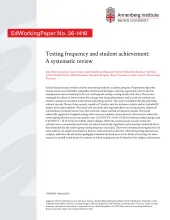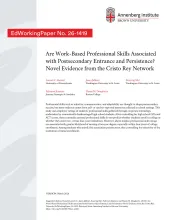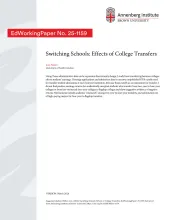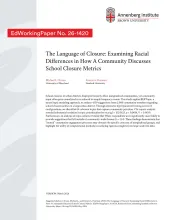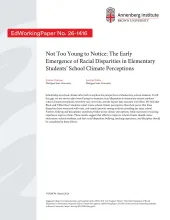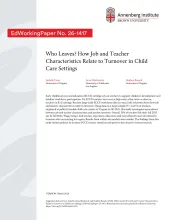The Trusted Source for Emerging Education Research
Researchers and policymakers can both benefit from timely access to research. EdWorkingPapers is a platform for prompt and open dissemination of high-quality studies. By connecting researchers and informing policymakers, the series accelerates progress in education.
Learn more about the platform →
Submit a paper
Have a paper you wish to post? Check out the EdWorkingPapers' scope and FAQs, and then submit your manuscript.
NEW EdWorkingPapers
Testing frequency and student achievement: A systematic review
School-based testing is widely used for monitoring students’ academic progress. Proponents argue that testing ensures accountability and guides teachers and managers, whereas opponents point to adverse consequences such as teaching to the test, and frequent testing creating anxiety and stress. This review examined the effects of interventions that change how frequently primary and second-ary… more →
Are Work-Based Professional Skills Associated with Postsecondary Entrance and Persistence? Novel Evidence from the Cristo Rey Network
Professional skills such as initiative, communication, and adaptability are thought to shape postsecondary success, but most evidence comes from self- or teacher-reported measures collected in school settings. This study uses employer ratings of students’ professional skills gathered through corporate internships undertaken by economically disadvantaged high school students. After controlling… more →
Switching Schools: Effects of College Transfers
Using Texas administrative data and a regression discontinuity design, I study how transferring between colleges affects students’ earnings. I leverage applications and admissions data to uncover unpublished GPA cutoffs used for transfer student admissions at each fouryear institution, then use these cutoffs as an instrument for transfer. I do not find positive earnings returns for… more →
The Language of Closure: Examining Racial Differences in How A Community Discusses School Closure Metrics
School closures in urban districts disproportionately affect marginalized communities, yet community input often goes unanalyzed or is reduced to simple frequency counts. This study applies BERTopic, a neural topic modeling approach, to analyze 4,159 suggestions from 2,006 community members regarding school closure metrics in a large urban district. Through extensive hyperparameter tuning… more →
Not Too Young to Notice: The Early Emergence of Racial Disparities in Elementary Students’ School Climate Perceptions
Scholarship on school climate often fails to explore the perspectives of elementary-school students. To fill this gap, we use survey-data from Georgia to examine racial disparities in elementary-school students’ school climate perceptions, how they vary over time, and the factors that associate with them. We find that Black and "Other Race" students report worse school climate perceptions than… more →
Who Leaves? How Job and Teacher Characteristics Relate to Turnover in Child Care Settings
Early childhood care and education (ECCE) settings rely on teachers to support children’s development and families’ workforce participation. Yet ECCE teachers turn over at high rates, often twice as often as teachers in K-12 settings. Because large-scale ECCE workforce data are rare, little is known about how job and teacher characteristics relate to turnover. Using data on a large sample (N… more →
Policy and Practice Series
Webinar Series
The Bigger Picture: Key Trends in America’s Changing Education Landscape
Are the enrollment and achievement declines we’re seeing just pandemic fallout, or something deeper? The papers featured in this webinar provide essential context for evaluating common narratives about recent changes in student achievement and enrollment.
